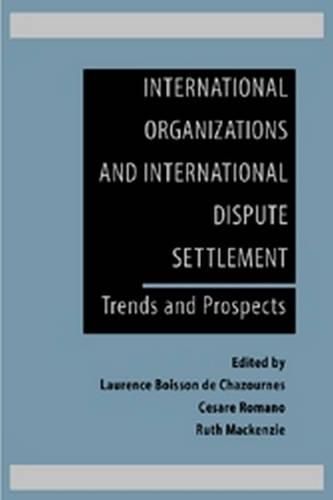Readings Newsletter
Become a Readings Member to make your shopping experience even easier.
Sign in or sign up for free!
You’re not far away from qualifying for FREE standard shipping within Australia
You’ve qualified for FREE standard shipping within Australia
The cart is loading…






This book contains the thoughts of officials of international organisations and NGOs, member of judicial bodies, and academics on the role of international organisations and the settlement of contentious cases before international judicial bodies. At a time when States are delegating a larger range of powers to international organisations their access to international judicial bodies remains very restricted. For example at the International Court of Justice international organisations can play no role in litigating cases. Their only access is the ability to request an ‘advisory opinion’ and that right is limited to just some UN agencies. In addition to the lack of access, the other theme of this work is a discussion of the issue of the independence of international judicial bodies from the organisations to which they belong. It is crucial for the credibility of the international judicial system for judicial bodies to act independently from the body to which they belong. From the perspective of this book, international organisations are self-contained worlds where judicial and political organs interplay. The question is posed whether these are censurable liaisons. Examples are presented for the World Bank, the WTO, for the new International Criminal Court and the UN Security Council. This is an extremely timely book that will be of interest to practitioners and scholars who are involved in issues related to cases before international judicial bodies.
$9.00 standard shipping within Australia
FREE standard shipping within Australia for orders over $100.00
Express & International shipping calculated at checkout
This book contains the thoughts of officials of international organisations and NGOs, member of judicial bodies, and academics on the role of international organisations and the settlement of contentious cases before international judicial bodies. At a time when States are delegating a larger range of powers to international organisations their access to international judicial bodies remains very restricted. For example at the International Court of Justice international organisations can play no role in litigating cases. Their only access is the ability to request an ‘advisory opinion’ and that right is limited to just some UN agencies. In addition to the lack of access, the other theme of this work is a discussion of the issue of the independence of international judicial bodies from the organisations to which they belong. It is crucial for the credibility of the international judicial system for judicial bodies to act independently from the body to which they belong. From the perspective of this book, international organisations are self-contained worlds where judicial and political organs interplay. The question is posed whether these are censurable liaisons. Examples are presented for the World Bank, the WTO, for the new International Criminal Court and the UN Security Council. This is an extremely timely book that will be of interest to practitioners and scholars who are involved in issues related to cases before international judicial bodies.